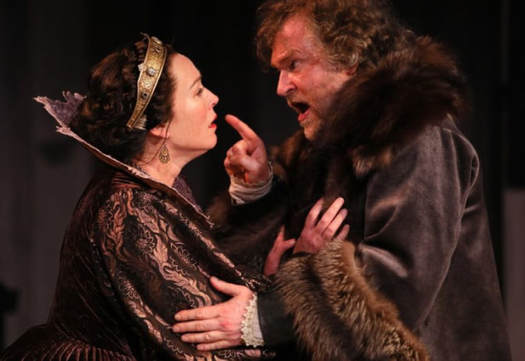A little bit about the story:
Macbeth and fellow soldier Banquo, fresh from battle, encounter three forest hags who prophesize Macbeth’s rise to power from soldier to Thane of Cawdor and ultimately King of Scotland. The hags then, paradoxically, add that Banquo’s heirs too will be kings though he himself will not. Macbeth is hesitant to believe his good fortune but when he is later given the news he has been named Thane of Cawdor he begins to dream of a future when he might be king.
Macbeth may be willing to wait out the course of events but Lady Macbeth is an impatient, manipulative piece of work. She convinces Macbeth that in order to ensure his ascension to the throne, and subsequently speed things up, he must murder the present ruler, King Duncan. Macbeth does her bidding but collapses in remorse spurring Lady Macbeth to complete their plan.
She drugs and frames King Duncan’s two chamberlains with the crime, placing the bloody daggers in their hands as they sleep. Early the following morning, when the chamberlains are emerging from their stupor, Macbeth arrives with Macduff, the Thane of Fife and catch them red-handed. Before the chamberlains have a chance to protest their innocence Macbeth kills them in a feigned fit of anger at their dastardly deeds. King Duncan’s two sons then flee for their lives and the deal is sealed: Macbeth is king.
Macbeth is a better soldier than cold-blooded murderer and his mind slowly unhinges. Manically intent on keeping his crown he grows increasingly unstable and wary of everyone, especially his good friend Banquo and his kingly heirs. In a fit of madness he sends soldiers to murder him and his sons. Macbeth’s plan to murder the other prophesized kings is only partially successful and he returns to plead with the hags to elaborate on their ramblings so he might steady his course. They oblige, which leads Macbeth further down the murderous rabbit hole, only this time it is he and Lady Macbeth who meet their own bloody end.
The play seemed doomed from the start, which I suppose could be interpreted as a good thing for a tragedy. The stage filled with most of the main characters and all were vibrating with a captivating foreboding until one actor broke the fourth wall to smile and nod at a friend in the audience (pop! Bubble burst). Not the best start.
The action picks up though when Macbeth and Banquo encounter the hags. Kate Besworth (Witch 2) sets the bar for the other two hags with her commitment to character. The dialogue, though convoluted as Shakespeare can get, is articulated clearly and the actors (Craig Erickson, Ben Carlson) are well versed in translating that through their physicality. Later when Macbeth struggles with his conscience Carlson draws us in to his vulnerability as he reaches the breaking point.
The ability to articulate when nothing is being said, or better, when what is being said is largely un-comprehensible without a translator or prior knowledge of the text, cannot be overstated. Job well done.
On the flip side of this, it is frustratingly difficult to take advantage of these skills when the volume is so incredibly high. Holy smokes! There were times when we leaned in close to make the connection only to be blasted back by either thundering, dialogue or the relentless boom, boom, boom, of performance squashing drums. It took our breath away, and not in a good way. If humans can’t breathe they either die or pass out. I don’t think anyone died but a couple of people were definitely blasted out of their seats never to be seen again after intermission.
Things were intense throughout most of the play, in fact, so doggedly intense that at the end when King Duncan’s son Malcolm is declared king his reaction was met with muffled laughter. There was nothing in the performance to pull this from the audience, rather it read more like a nervous reaction to being chained to ruination for the previous two hours.
Abraham did manage to break the tension once early in the first half of the play with a vamped up a drunkard who broke the fourth wall (it worked here) and made us giggle. This was a good choice, probably the only place for Abraham to inject a little humor and it was well received.
Regardless of what didn’t work (and that’s entirely biased) so much more of Abrahams choices did. Macbeth is a play worth watching. The actors are dedicated and professional, the costumes are magnificent, and the methodology is fascinating. A suggestion for those who are new to the play: it’s Shakespeare’s shortest, coming in at roughly 21 – 24 pages long, a quick read, well worth the effort, and sure to make you experience with the Bard a lot more enjoyable.
For a link to tickets click HERE.


 RSS Feed
RSS Feed
